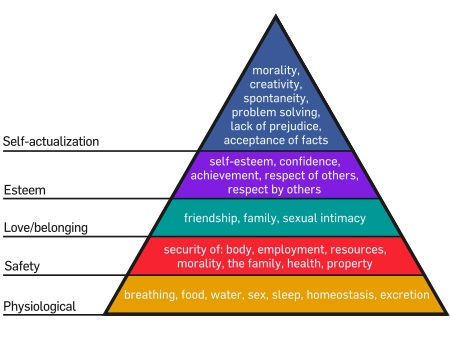Coaching and Life: A Linear View of Maslow's Hierarchy
- Renny Sabisch
- Feb 7, 2016
- 2 min read
“We are not in a position in which we have nothing to work with.
We already have capacities, talents, direction, mission, callings.”
– Abraham Maslow

One of the earliest and most widespread versions of Abraham Maslow's (1943, 1954) hierarchy of needs includes five motivational needs, and one of Abraham Maslow theories as written in a paper he wrote back in 1943, "A Theory of Human Motivation" (Maslow, 1943).
Exercising self-determination and awareness plays a significant part in our role of autonomic growth. One of things I admire about Abraham Maslow was his approach to humanistic needs that focused less on psychopathology (e.g., psychiatric disorders) and more on personal developments and the realization of one’s full potential. Abraham Maslow felt that our human development occurred in consecutive stages that entailed basic biological and physical needs. He expanded his original five-stage model found in the hierarchy of needs, which included cognitive functions, self-actualization, and transcendence needs.
One of the differences I see as a coach is the focus on these latter stages. As a counselor specializing in basic needs, I find many people struggling with the safety stage throughout their lives. Most of the people I have counseled have numerous difficulties found within social development and nearly all have a significant deficit in esteem and finding a healthy sense of self-worth. As a coach, I feel emphasis may focus a little on the third stage, social needs. Why? Because as a coach, emphasis may be put a little on the third stage, social needs. It can help someone set goals to improve relationships at home or at work with regard to building a better social network, but in state four of the esteem needs, it may inspire one to set goals that increase self-esteem, or to increase a sense of achievement but enhancing the sense of personal empowerments. Either way, it requires tweaking and expanding in coaching rather than being at a more serious level of counseling.
In the cognitive, stage five of needs, is about finding a more purposeful meaning in life by gaining knowledge. As coach my aim is to help guide clients in the discovery of how new knowledge can stimulate those changes that can propel new adventures. From personal experiences, if we can see things from different perspectives, new transformations can come forward. These are all stepping-stones in the realization of one’s potential, personal growth, and living a fulfilled life.
Reference
Maslow, A H (1943). A theory of human motivation; Psychological Review, Vol 50(4), Jul 1943, 370-396. http://dx.doi.org/10.1037/h0054346















Commentaires